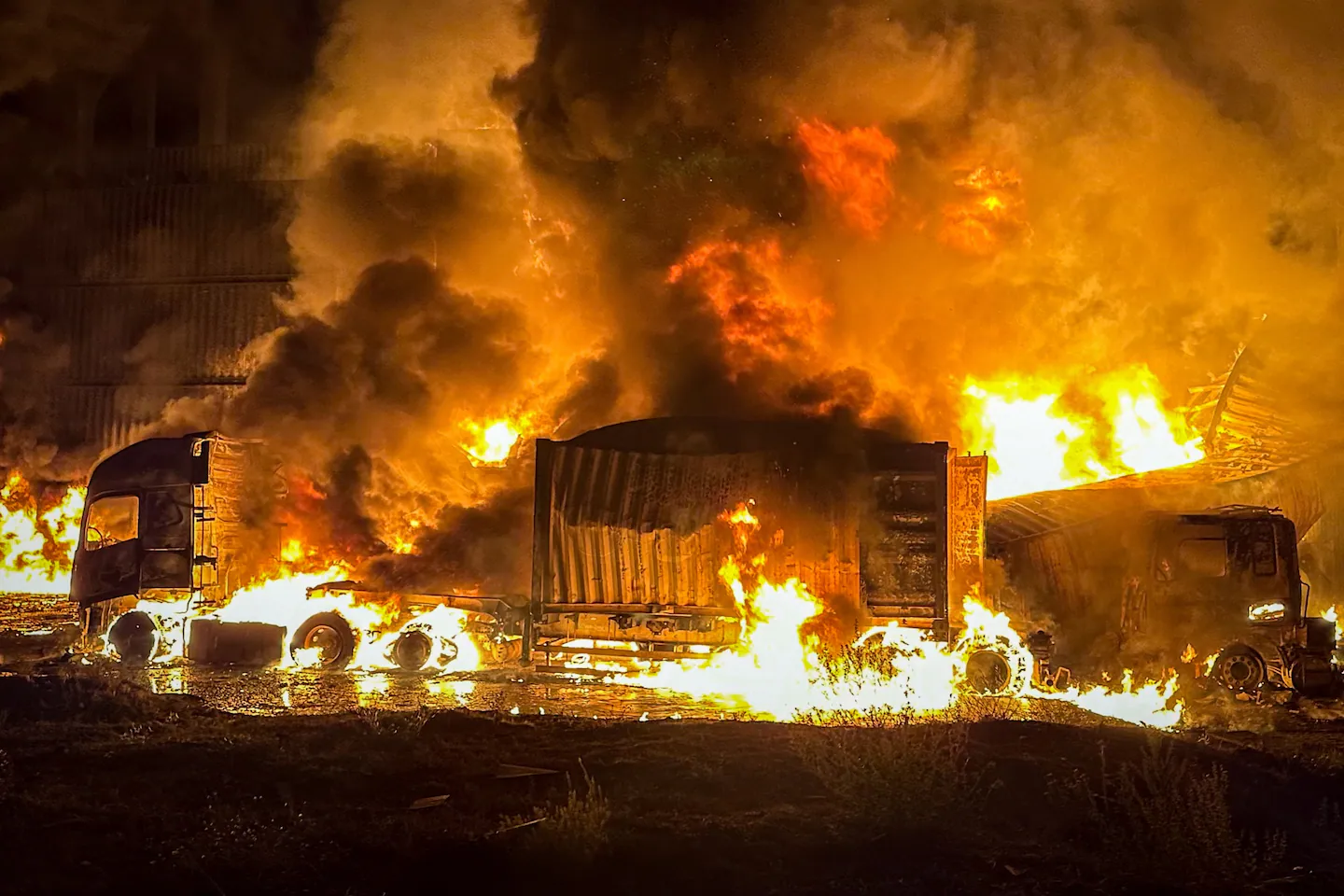
“Russia’s task is to create chaos and apply psychological pressure on the population through strikes on energy facilities and railways,” Ukrainian President Volodymyr Zelensky said during a briefing with journalists Wednesday. “They target our energy infrastructure or fuel-generation centers.”
Sergii Koretskyi, CEO of Naftogaz, Ukraine’s state-owned oil and gas company, said Russian forces on Oct. 3 carried out “the largest strike on Naftogaz Group’s gas production facilities since the start of the full-scale invasion.”
Overnight, “facilities in Kharkiv and Poltava regions were hit with 35 missiles, many of them ballistic, along with 60 drones,” he said in a statement. “Some were successfully intercepted. Unfortunately, not all.”
Russia’s Ministry of Defense said at the time that the attack was against “Ukrainian military-industrial-complex facilities and the gas and energy infrastructure supporting their operation” and described it as successful.
Koretskyi did not say how extensive the damage was but said that “a significant portion of our facilities has been damaged” and that “some of the destruction is critical.”
He said that the infrastructure hit was involved in providing services for the civilian population. “There was no military purpose or rationale. It was yet another display of Russian malice, aimed solely at disrupting the heating season and depriving Ukrainians of the ability to heat their homes this winter.”
Citing unnamed sources, Bloomberg News said the strikes destroyed around 60 percent of the country’s gas production and would require the purchase of 4.4 billion cubic meters of gas by the end of winter — nearly 20 percent of the country’s annual consumption. Ukrainian officials would not confirm the figures.
While the heating in the cities comes from the electricity provided by power plants that run on gas and coal, rural areas rely on natural gas for heating and cooking.
Victoria Voytsitska, an energy expert on the supervisory board of the We Build Ukraine think tank, said Moscow’s focus on the gas network is a shift in tactics to targeting rural populations.
“Before, Russia was primarily targeting power stations and the electrical grid, trying to bring blackouts to urban citizens and business,” she said. “This time, the prime targets are those energy assets that have a direct impact on both urban and rural citizens — especially in light of the fact that in rural areas, gas is used for not only cooking but also heating of houses.”
When cities experienced blackouts and shortages of heat and hot water during previous winters, people moved in with relatives or leased houses in villages, she said. “This time, this option might not work.”
On Tuesday, Energy Minister Svitlana Grynchuk said that Ukraine would need to increase natural gas imports by 30 percent this winter, without specifying the exact amount.
Ultimately, the amount of extra gas that will be needed depends on “how quickly we can restore” the gas system, “how intensive the targeted attacks will be,” and “how great the damage to the gas transport system and oil and gas sector will be,” she said.
On Thursday, Naftogaz announced it had secured a loan of around $70 million from Ukraine’s state savings bank Oschadbank to purchase natural gas this winter. Earlier this year, Naftogaz received a loan of more than $500 million from the European Bank for Reconstruction and Development and $300 million from the European Investment Bank.
Russia is also targeting Ukraine’s electrical grid, following a strategy that it pursued over past winters, bombarding the country’s power stations and electrical transmission equipment.
On Wednesday, Maxim Timchenko, CEO of DTEK, Ukraine’s largest private energy company, said that a Russian aerial attack caused “serious damage” to one of his company’s power plants.
“With cynical timing, Russia resumed its campaign against DTEK power stations, just as we are about to enter winter,” Timchenko wrote on X, adding that DTEK repair teams were “working to restore operations.”
The attacks on energy infrastructure, however, are not just in one direction. Ukrainian drones have gone after Russia’s oil refineries, causing gasoline shortages, and hit power plants. In the border region of Belgorod, Russia, thousands were left without electricity and five people died, after Ukrainian strikes over the past three days, local governor Vyacheslav Gladkov said.
On Thursday, Ukrainian forces struck Lukoil’s Korobkovsky gas-processing plant in Russia’s Volgograd region, “one of the largest plants for the primary processing of natural gas and associated petroleum gas in southern Russia,” Ukraine’s general staff said on Telegram. This follows several strikes on Russian oil and gas plants and refineries throughout September and October.
Zelensky denied Wednesday that Ukrainian forces were killing civilians and said that Russia’s civilian infrastructure was a legitimate military target. He said that gasoline supplies in Russia may have dropped around 20 percent as a result of Ukrainian attacks.
“One of the most intense directions from which they strike Ukraine is the Belgorod axis,” Zelensky said. “Where do missiles fly to the Kharkiv region from? Where did hundreds, and now thousands, of glide bombs come from? From there.”
“Maybe they feel quite comfortable staying in Belgorod if they are doing this,” he said.
On social media, he likewise defended Ukraine’s attacks on Russia’s oil and gas sector.
“Ukraine strikes back, hitting military targets and energy facilities that sell their energy resources,” he wrote on X. “Russia sells its energy resources and then uses that money exclusively for war. That is why Ukraine is taking absolutely just steps.”
Voytsitska, the energy expert, said that the war had entered a new phase: “The war of attrition on the battlefield” was now “a war of attrition against the population.”
Ukrainians had “a competitive advantage” of going without electricity, heat and hot water during the previous winters, she said, making them more used to this kind of deprivation.
“The Russians do not have this kind of inoculation, and their readiness to sacrifice their own well-being and comfort for the ephemeral goals of the Kremlin elite is highly doubtful,” she added.